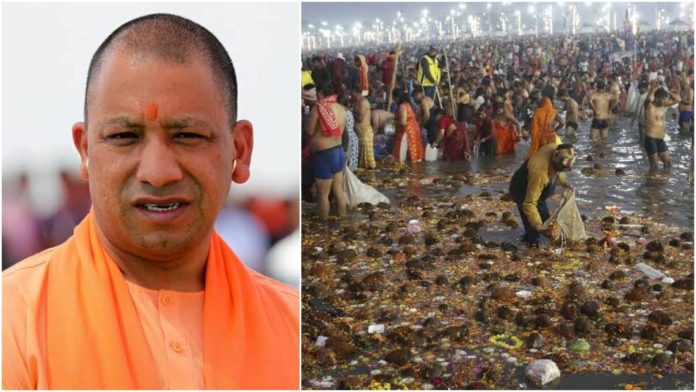Prayagraj: Despite Uttar Pradesh Chief Minister Yogi Adityanath’s assurances that the water at Sangam during the ongoing Maha Kumbh is fit for drinking, reports from the Central Pollution Control Board (CPCB) suggest otherwise, raising serious health concerns.
Addressing the state Assembly, CM Yogi claimed that all drains around the Sangam had been sealed and water was being released only after purification. He cited data from the UP Pollution Control Board, which showed a Biochemical Oxygen Demand (BOD) level below 3 and Dissolved Oxygen (DO) around 8-9, indicating suitability for both bathing and ritual consumption (Aachman).
However, a CPCB report submitted to the National Green Tribunal (NGT) contradicts these claims, highlighting alarmingly high levels of faecal coliform—an indicator of sewage contamination. According to CPCB data from February 4, the permissible limit for faecal coliform is 2,500 MPN/100ml, yet recorded levels were:
11,000 MPN/100ml in the Ganga before Shastri Bridge,
7,900 MPN/100ml at Sangam,
4,900 MPN/100ml in the Yamuna near Old Naini Bridge.
According to KnowYourH2O, a US-based water research initiative, faecal coliform presence at such high levels indicates the risk of waterborne diseases like typhoid, gastroenteritis, dysentery, and cholera. Dr. Atul Kakar, a senior consultant at Sir Ganga Ram Hospital, warned that such contamination suggests poor sanitation and exposure to dangerous pathogens, making the water unsafe for consumption.
Additionally, a World Health Organization (WHO) study highlights that drinking or using contaminated water can cause hepatitis, giardiasis, and schistosomiasis. The spread of disease is not limited to direct consumption—farmers using this water for irrigation could also face significant health risks.
Despite these warnings, the Uttar Pradesh jail administration has planned a special ritual allowing inmates across 75 jails to bathe in water collected from the Sangam. The event is set for February 21, with arrangements being overseen by the state’s prison authorities.
As the Maha Kumbh continues, the contradiction between official claims and scientific reports raises serious concerns about public health, especially as millions of devotees participate in the festival.




